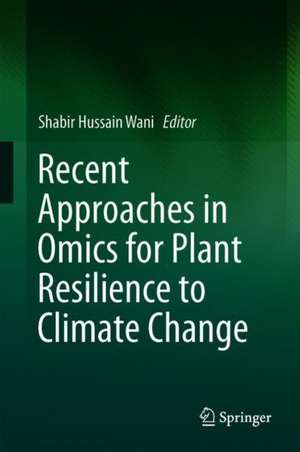Recent Approaches in Omics for Plant Resilience to Climate Change
Editat de Shabir Hussain Wanien Limba Engleză Hardback – 22 aug 2019
| Toate formatele și edițiile | Preț | Express |
|---|---|---|
| Paperback (1) | 1222.62 lei 6-8 săpt. | |
| Springer International Publishing – 23 aug 2020 | 1222.62 lei 6-8 săpt. | |
| Hardback (1) | 1228.77 lei 6-8 săpt. | |
| Springer International Publishing – 22 aug 2019 | 1228.77 lei 6-8 săpt. |
Preț: 1228.77 lei
Preț vechi: 1498.51 lei
-18% Nou
Puncte Express: 1843
Preț estimativ în valută:
235.20€ • 255.56$ • 197.70£
235.20€ • 255.56$ • 197.70£
Carte tipărită la comandă
Livrare economică 21 aprilie-05 mai
Preluare comenzi: 021 569.72.76
Specificații
ISBN-13: 9783030216863
ISBN-10: 3030216861
Pagini: 240
Ilustrații: XVI, 401 p. 20 illus. in color.
Dimensiuni: 155 x 235 mm
Greutate: 0.76 kg
Ediția:1st ed. 2019
Editura: Springer International Publishing
Colecția Springer
Locul publicării:Cham, Switzerland
ISBN-10: 3030216861
Pagini: 240
Ilustrații: XVI, 401 p. 20 illus. in color.
Dimensiuni: 155 x 235 mm
Greutate: 0.76 kg
Ediția:1st ed. 2019
Editura: Springer International Publishing
Colecția Springer
Locul publicării:Cham, Switzerland
Cuprins
1. Omics Technologies for Abiotic Stress Tolerance in Plants: Current status and Prospects.- 2. Genome editing and abiotic stress Tolerance in Plants.- 3. Metabolomic Profiling of plants to understand reasons for plant stress resilience to abiotic stress.- 4. In Vitro Screening of Crop Plants for Abiotic Stress Tolerance.- 5. Open-source software tools, databases and resources for single cell and single cell-type metabolomics.- 6. Advances in functional genomics in investigating salinity tolerance in plants.- 7. Drought stress in Chickpea: Physiological, Breeding and Omics Perspectives.- 8. GM maize for abiotic stresses; Potentials and opportunities.- 9. Novel breeding and biotechnological approaches to mitigate effects of heat stress on cotton.- 10. Modulation Of Proteome And Phosphoproteome Under Abiotic Stress In Plants: An Overview.- 11. Ionomic approaches for the discovery of novel abiotic stress tolerance genes in plants.- 12. Unravelling the complex networks involved in Plant stress tolerance through Metabolomics.
Notă biografică
Dr. Shabir Hussain Wani is Assistant Professor ( Senior Scale) at Mountain Research Centre for Field Crops, Khudwani –192101, Sher-e-Kashmir University of Agricultural Sciences and Technology of Kashmir, J&K, India. He received Ph.D. degree in plant breeding and genetics on “transgenic rice for abiotic stress tolerance” from the Punjab Agricultural University Ludhiana, India. After obtaining his Ph.D. he worked as research associate in the Biotechnology Laboratory, Central Institute of Temperate Horticulture (ICAR), Srinagar, India. He then joined the Krishi Vigyan Kendra (Farm Science Centre) as program coordinator at Senapati, Manipur, India. He teaches courses related to plant breeding, seed science and technology, and stress breeding and has published more than 100 papers/chapters in journals and books of international and national repute. He served as guest editor and reviews editor for journal Frontier in Plant Science (2015-2018). He has also edited several books on current topics in crop improvement for abiotic stress tolerance published by Springer Nature and CRC press USA. His Ph.D. research fetched first prize in the North Zone Competition, at national level, in India. He was awarded Young Scientist Award from the Society for Promotion of Plant Sciences, Jaipur, India, in 2009. He is a fellow of the Society for Plant Research, India. Recently he also received Young Scientist Award (Agriculture) 2015 from Society for Plant Research, Meerut, India. He also served as visiting Scientist at Department of Plant Soil and Microbial Sciences, Michigan State University, USA under the UGC Raman Post Doctoral Fellowship programme. Currently, he is leading the Wheat improvement programme at MRCFC Khudwani SKAUST Kashmir.
Textul de pe ultima copertă
This edited volume summarizes the recent advancements made in plant science including molecular biology and genome editing , particularly in the development of novel pathways tolerant to climate change-induced stresses such as drought, extreme temperatures, cold, salinity, flooding, etc. These stresses are liable for decrease in yields in many crop plants at global level. Till date conventional plant breeding approaches have resulted in significant improvement of crop plants for producing higher yields during adverse climatic conditions. However, the pace of improvement through conventional plant breeding needs to be accelerated in keeping with the growing demand of food and increasing human populationl, particularly in developing world. This book serves as a comprehensive reference material for researchers, teachers, and students involved in climate change-related abiotic stress tolerance studies in plants.
Caracteristici
Addresses the current hot topics of plant resilience to climate change Covers recent topics on metabolomics and micro-omics, proteomics, genomics and their applications in major crop plants such as legumes, maize and cotton Presents recent research that will be of interest to scientists and research groups involved in plant resilience development
